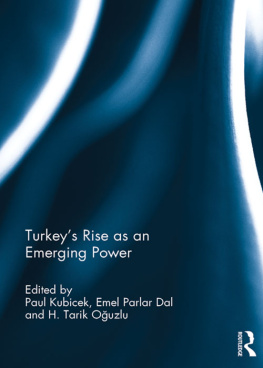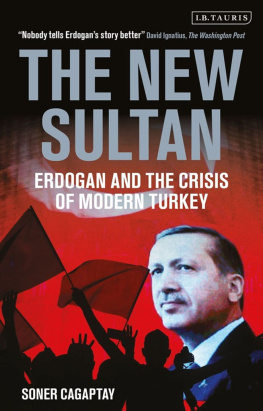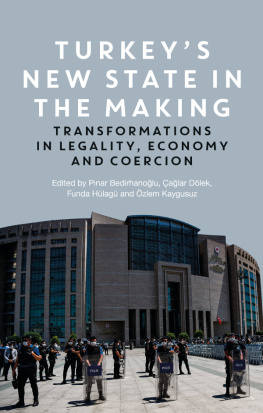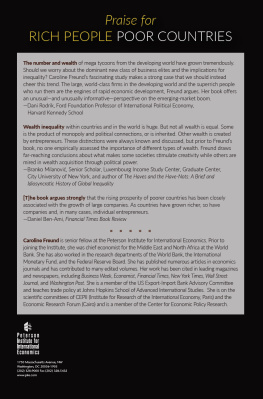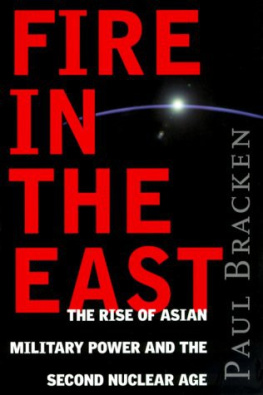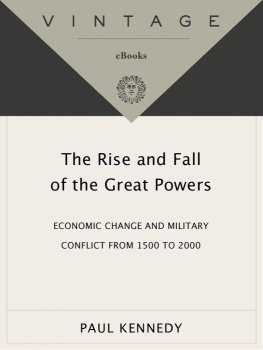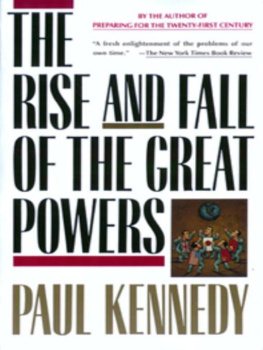Turkeys Rise as an Emerging Power
Turkey is emerging as an important actor in world politics, exerting growing influence both in its immediate region and beyond. This book aims to understand and explain this phenomenon, utilizing a variety of perspectives from international relations theory. One prominent issue is how Turkey, long embedded in the West via NATO and other European organizations, is growing more confident and is asserting more independent foreign policy positions. This is particularly marked in the Middle East, where some suggest Turkey is pursuing a neo-Ottomanist agenda. At times, this competes with and creates tensions with the West. However, a rising Turkey can also be a constructive phenomenon and complement the West. This book examines geopolitical, economic, and cultural dimensions of Turkeys rise, pointing to both Turkish success and the limits of Turkish power and influence. It includes consideration of Turkeys relations with NATO, the European Union, the Middle East, and BRIC countries.
This book was originally published as a special issue of Turkish Studies.
Emel Parlar Dal received her PhD from Paris 3 Sorbonne Nouvelle University in France and is Associate Professor of International Relations at Marmara University, Turkey.
Paul Kubicek is Professor of Political Science and Director of International Studies at Oakland University, USA. He is Editor of Turkish Studies.
H. Tarik Ouzlu is Professor of International Relations and Director of the Center for Social, Economic, and Political Research at Antalya International University, Turkey.
Turkeys Rise as an Emerging Power
Edited by
Emel Parlar Dal, Paul Kubicek and H. Tarik Ouzlu
First published 2015
by Routledge
2 Park Square, Milton Park, Abingdon, Oxon, OX14 4RN, UK
and by Routledge
711 Third Avenue, New York, NY 10017, USA
Routledge is an imprint of the Taylor & Francis Group, an informa business
2015 Taylor & Francis
All rights reserved. No part of this book may be reprinted or reproduced or utilised in any form or by any electronic, mechanical, or other means, now known or hereafter invented, including photocopying and recording, or in any information storage or retrieval system, without permission in writing from the publishers.
Trademark notice : Product or corporate names may be trademarks or registered trademarks, and are used only for identification and explanation without intent to infringe.
British Library Cataloguing in Publication Data
A catalogue record for this book is available from the British Library
ISBN 13: 978-1-138-81850-7
ePub eISBN 13: 978-1-317-59444-4
Mobipocket/Kindle eISBN 13: 978-1-317-59443-7
Typeset in Times New Roman
by RefineCatch Limited, Bungay, Suffolk
Publishers Note
The publisher accepts responsibility for any inconsistencies that may have arisen during the conversion of this book from journal articles to book chapters, namely the possible inclusion of journal terminology.
Disclaimer
Every effort has been made to contact copyright holders for their permission to reprint material in this book. The publishers would be grateful to hear from any copyright holder who is not here acknowledged and will undertake to rectify any errors or omissions in future editions of this book.
Contents
Tarik Ouzlu & Emel Parlar Dal
aban Karda
Murat Yeilta
Cerem I. Cenker zek & Tarik Ouzlu
Emel Parlar Dal
Pinar Akpinar
Gokhan Bacik
Tarik Ouzlu
Soner Cagaptay
The chapters in this book were originally published in Turkish Studies, volume 14, issue 4 (December 2013). When citing this material, please use the original page numbering for each article, as follows:
Chapter 1
Decoding Turkeys Rise: An Introduction
Tarik Ouzlu & Emel Parlar Dal
Turkish Studies, volume 14, issue 4 (December 2013) pp. 617636
Chapter 2
Turkey: A Regional Power Facing a Changing International System
aban Karda
Turkish Studies, volume 14, issue 4 (December 2013) pp. 637660
Chapter 3
The Transformation of the Geopolitical Vision in Turkish Foreign Policy
Murat Yeilta
Turkish Studies, volume 14, issue 4 (December 2013) pp. 661687
Chapter 4
Beyond the Institutional Logics: International Level Systemic Analysis of EUTurkish Relations
Cerem I. Cenker zek & Tarik Ouzlu
Turkish Studies, volume 14, issue 4 (December 2013) pp. 688708
Chapter 5
Assessing Turkeys Normative Power in the Middle East and North Africa Region: New Dynamics and their Limitations
Emel Parlar Dal
Turkish Studies, volume 14, issue 4 (December 2013) pp. 709734
Chapter 6
Turkeys Peacebuilding in Somalia: The Limits of Humanitarian Diplomacy
Pinar Akpinar
Turkish Studies, volume 14, issue 4 (December 2013) pp. 735757
Chapter 7
Turkey and the BRICS: Can Turkey Join the BRICS?
Gokhan Bacik
Turkish Studies, volume 14, issue 4 (December 2013) pp. 758773
Chapter 8
Making Sense of Turkeys Rising Power Status: What Does Turkeys Approach Within NATO Tell Us?
Tarik Ouzlu
Turkish Studies, volume 14, issue 4 (December 2013) pp. 774796
Chapter 9
Defining Turkish Power: Turkey as a Rising Power Embedded in the Western International System
Soner Cagaptay
Turkish Studies, volume 14, issue 4 (December 2013) pp. 797811
Please direct any queries you may have about the citations to
clsuk.permissions@cengage.com
TARIK OUZLU* & EMEL PARLAR DAL**
*Department of Political Science and International Relations, International Antalya University, Antalya, Turkey; **Department of Political Science and International Relations, Marmara University, Anadoluhisar Campus, Beykoz, Istanbul, Turkey
A BSTRACT Acknowledging Turkey as a rising power, and having commonalities in both objectives and outcomes with the other rising Southern powers, this study is a modest attempt to decode Turkeys rise with/within the West discursively and empirically and at multiple levels: systemic, regional and agent-based domestic. It aims to contribute to the debate over rising powers by developing new conceptualizations and challenging or reinterpreting the existing theoretical approaches in order to define Turkeys current power status vis--vis both other rising powers and the major Western powers. Turkeys recent rise, which has also been characterized by the countrys high economic growth, must be nuanced from that of the Global South countries in some principal aspects. Unlike other rising powers, the Western factor weights more heavily in Turkeys recent rise. This issues novel contribution to the existing literature on Turkish foreign policy is its attempt to understand Turkeys current rise, as well as its limitations in the context of its decades-long institutionalized and strategic relations with the West.
Introduction
The important systemic and regional changes occurring that we have witnessed in the last decade have also coincided with the rise of the geopolitical and geo-economic power of the emerging market countries, especially the larger ones that were grouped as the BRICs. In recent years in international relations literature considerable attention has been given to rising powers, their role and power capabilities in the eroding international system, as well as their increasing activism in global affairs. Rising power literature has seen important progress since 2010 and has become a cottage industry. Many academic articles, dealing with various aspects of rising powers, particularly on the Global South, are now devoted to the ongoing debate over the essential characteristics of rising powers. These debates also focus on commonalities and main distinctions among rising powers, as well as on the way they are involved in the shaping of the regional order in their respective regions. Despite the increasing scholarly interest in these rising regional powers in the South, however, few attempts have been made to understand the main systemic, regional and domestic reasons behind the current rise of Turkey, another rising power in its region, and to conceptualize as well as to theorize about its rising under its own particular conditions.


